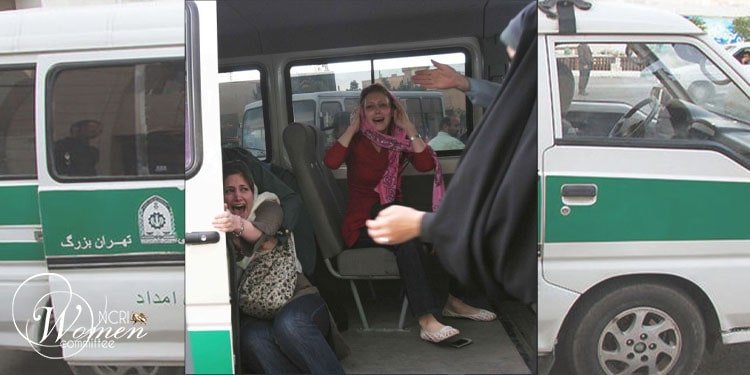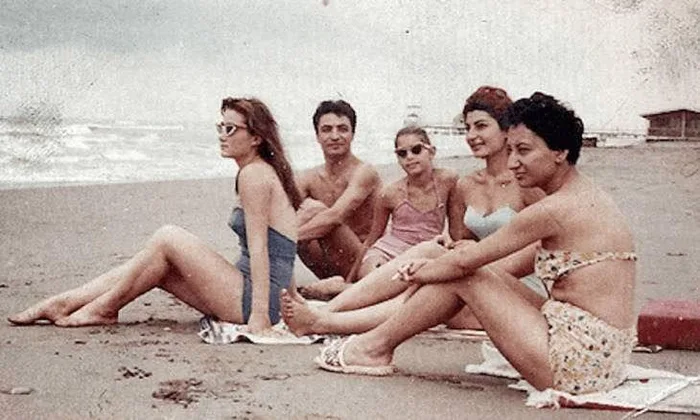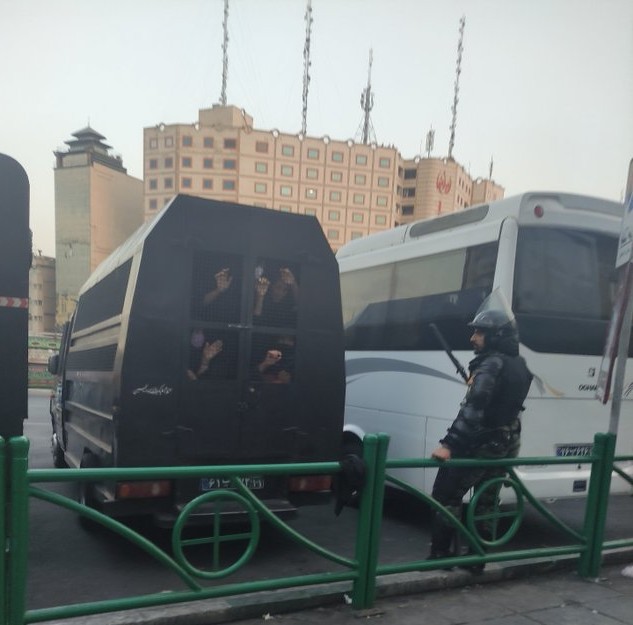Fashion Folklore is a series of interviews where real people unpack how Fashion impacts their life. This is Ariana's story up until she moved to Australia.
"I’m not special, my story isn’t special"
Ariana grew up in Tehran, Iran.
Tehran is the heart of a nation notorious for the aggressively-oppressive treatment of women.
As I sit with Ariana here in Australia, casually drinking wine outside, I find it hard to imagine someone like her living there.
Someone as vibrant… as alive, and as passionately silly as her… how could that person even exist in a place where women aren’t supposed to attract any kind of attention, legally?
The short answer is that she couldn’t. In fact, as the way things are now, I don’t think any woman geniuenly could.
Iran has an inherently-misogynistic set of laws dictating life; while in public, a woman must hide everything but her face and hands, including even strands of hair.
Inherent, not because it’s a fundamental part of the land’s culture; this was Iran in the 70’s.

Inherent because currently, the legal system is Sharia based and in turn, has the devaluation of women baked in.
(If you are worried that this line of reasoning is disrespectful to Muslims, click on this section)
I grew up Muslim. My wedding ceremony was in a mosque with a proper Imam. At the risk of sounding trite, some of my best friends to this day are Muslim.
What I’m trying to say is that this is not a critcism of Islam; this is a modernist approach to the theology that distinguishes between the dogma, which is contextual, and the belief system itself, which is timeless.
Like a lot of modern Muslim women, I am of the belief that if Islamic dogma was re-written today, it would be very different. After all, was the prophet not known as the first real feminist?
Handmade’s Tale on Crack
In current Iranian/Sharia courts, a woman’s opinion is legally worth ½ that of a man’s, which results in things like two female witnesses being needed where a single man would suffice.
In estate matters, the most they could ever inherit is less than half of what a man would.
Without a man’s permission, women are not allowed to travel…
More elaborate moves, like riding bicycles or, god forbid, dancing are banned entirely.
That’s right, dancing is illegal in Iran.
So what happens if you break these laws, even mildly?
If your hair accidentally slips out of your headscarf and the enforcing officers have nothing better to do, you could face a violent and painful public lashing.
Officers physically disciplining grown women on the street or throwing them into vans to be imprisoned or later killed; that’s Tehran right now.
And it’s getting worse.
Earlier this year, the Iranian President called for even harsher enforcement of the crushing dress-codes; now, just following the law isn’t good enough anymore.
Even if you’re wearing a hijab, you could still be one of the “bad-hijab” women the President singled out and opened season on.
Sure, you’re covering all your hair and nothing that “shouldn’t” be seen is visible, but what if you didn’t pick the dreariest colour possible? Or your ankle is mildly exposed?
Like anything else, it depends on the officer that “catches” you.
Is he having a good day? Does he think you’re sexy? One will end with him giving a stern warning, while the latter can cause him to kill you on the spot.
The point is that even if you were trying to be a “good” resident of the oppressive system, you are far from safe simply by virtue of being a woman.
The lack of detailed requirements surrounding the laws is on purpose. It allows a vague interpretation to be utilised at the behest of the interpreters, for whatever goal they deem “worthy”...
Do you trust an uneducated, frustrated, delusionally egotistical and maniacally religious “police officer” to make decisions such as whether you deserve to live?
Just think back on what primitive men can be like when their advances are rejected. Now think of giving those men the legal right to beat you to death if they don’t like your outfit and judge it as “slutty”.
Slutty, of course, includes things like wearing a multi-coloured head covering in contrast to a black one.

Think I’m exaggerating? Look up Mahsa Amini, a girl beaten to death just last month by the morality police. What was her crime?
She was far from flaunting the rules; less than an inch of hair was showing under her covering.
In fact, she was trying to follow them as best she could, but that wasn’t good enough.
Some pathetic officer caught a glimpse of her hair and her fate was sealed.
If you can sense my distaste and intolerance, good. I’m not trying to hide it.
Ariana tells me it wasn’t always like this. While she was growing up there, Tehran was still misogynistically-oriented, but it wasn’t the Handmade’s-Tale-on-Crack horror it is today.
The country’s long and complex sociolegal history regarding women and clothing has been told and analysed many times by people much more qualified than I on the matter, so I’ll abstain from rehashing.
Instead, I’ll tell you about Ariana’s relationship with the hijab; it’s complicated, as most women’s connection to the infamous headcovering is, but it also aptly symbolises the change that occurred in Iran.
A Complicated Coming-Of-Age Fashion Story
When Ariana turned seven, her mom helped her put on a headscarf so she could go to school.
She was so excited!
At the time, it didn’t feel like the oppressive symbol of an authoritarian government; for young Ariana, the headscarf was the key to a secret society. A sisterhood she had curiously observed her whole life and one she was eager to join.
Wearing a headscarf meant that she not only belonged, but also that she was officially a woman.
Clothing, like most things really, doesn’t inherently have any meaning.
It is the meaning we imbue it with that decides whether a simple cloth material, like a headscarf, will represent secular safety, religious devotion… or, as is the prominent case today, a tool that is used to subjugate an entire gender.
To Ariana, the headscarf started as a key and then slowly, over the years, became an obstacle.
As she entered her “going out” years, Ariana was determined to live life as fully as she could, regardless of what some old religious zealots wanted her to do and wear.
She would jump into a taxi covered from head to toe in dark veils and carry with her a massive bag that contained big pumps, a tight dress and enough make-up to outfit an entire highschool prom.
In retrospect, Ariana was clearly risking her life in exchange for a sense of normality, but back then, she didn’t blink at the trade.
She would head to a party, but she never quite got the Cinderella-entrance she deserved.
In fact, if anything, it was more like an early-days superhero that hasn’t quite yet mastered their secret identity switch.
Ariana would walk in discreetly, still dressed looking like a giant dark thumb, and drag her big bag to the bathroom wherein she would, after an arduous unpacking and changing process, reappear at the party finally as her gorgeous real self.
It wasn’t easy, nor was it safe, but to her, it was definitely worth it.
Iran was far from perfect in her eyes; just to enjoy a night out and feel pretty for a change, she would have to jump over more obstacles than her counterparts in the free world could even consider, but still, it was possible.
Now, what little normality could be squeezed out of Iran is down to a trickle, if not even a mirage.
While wearing skinny jeans back in Ariana’s day was far from popular, it would usually end with a harsh warning.
These days, it ends in getting you beaten to death without a warning.
96
People like Ariana tolerated the restrictions and the hijab because it was their way of life, but by taking away all chances of expression and freedom, the Iranian government had ironically also taken away any reason to tolerate the oppression further.
It couldn’t be their way of life anymore because there simply wasn’t any living to be had.
The only positive from Iran’s shift to even more abusive policy is that, for many, it was the straw that broke the camel’s back.
Ariana saw the writing on the wall long before Mahsa Amini’s death, and as the alluringly mysterious ancient city she once loved warped into a dystopian nightmare, she set her sights on getting out.
Leaving your homeland because it became a hellscape is complicated and doesn’t happen all at once, but eventually, Ariana packed her bags.
She knew that if she stayed long enough, eventually, they would get her; Ariana recounts the exact situation that pushed her off the fence
One day, she and a friend swam on a private beach and of course, the police got involved. This was the day Ariana became a criminal for wearing a swimsuit.

Iranian beach in the 70's, before Sharia law
They came, attempted to arrest them, and, were it not for Ariana’s family connections in the local police, they would have surely taken them in.
The idea of them, or any woman really, being “taken in” is chilling.
Another Iranian friend, who has been taken in, recounts; “First they take your phone away so you can’t call anyone and then you are all alone.”
What happens next doesn't depend on some objective legal authority, but rather, the whims of the arresting officer.
If you happen to have made the officer angry enough you might get a violent beating or lashing right then and there, but what’s for sure is that you’re getting thrown in the back of the van.

Iran 2022
As we finish our wine, I shudder to think how close Ariana came to ending up like one of the women in the photo.
She tells me all this and concludes by explaining that she lived a “normal” life, free from “revolutions”. I can sense a palpable sadness in her voice as she says this, like a melancholic survivor’s guilt.
She keeps explaining, saying “What was I going to do? People get tortured, killed, their families disapear. All I wanted was to be happy.” but I’ve given her no counter argument.
She thinks she took the easy way out.
No Ariana, the easy thing is what most would’ve done, which is to keep their head down, and even them I don’t fault.
How do women, that can’t even meet without their oppressors permission, organise a coup? After all, doesn’t the tallest blade get cut?
Ariana might regret not going all She-Hulk on Iran, but I for one am very glad that she didn’t, because I have no doubt that she would not be alive today.
She might not have been organising any revolutions, but Ariana was determined to live tall.
By living to fight another day, she became what the monsters running Iran fear the most; a free woman.
A free woman can dance, travel, make decisions; you know, all the stuff they seem to hate when women do...
I don’t know how to tell her that if it was me, I wouldn't have been brave enough to even go out to parties the way she did, much less consider “doing something” about the authoritarian government mowing down innocent civilians in the streets.
Ariana, you lived in a country where wearing a sundress is as good as a death-wish, and still you owned multiple.
There was no need for you to take part in any revolutions; your whole life is one.
Someday, when actual change takes place in Iran, it will be thanks to the foundation of global understanding set in place by women like you.
As I write this article, Tehran is a city in the midst of upheaval; Mahsa Amini’s death has pushed the citizens to the brink and they have begun protesting, rioting even, in a desperate attempt to make their terrified disgust known.
Since Mahsa Amini’s death (22. September, 2022), less than a month ago, more than 96 people have been murdered.
Who knows how many hundreds more died before the international spotlight shone and allowed for some non-propaganda sourced reportage?
Some people have told me I’m being naive if I believe that this incident will spark change, and that it will probably take even more deaths before the people are fed up enough to revolt, and I feel nauseous at the thought; how many more?
Read more Fashion stories here.
